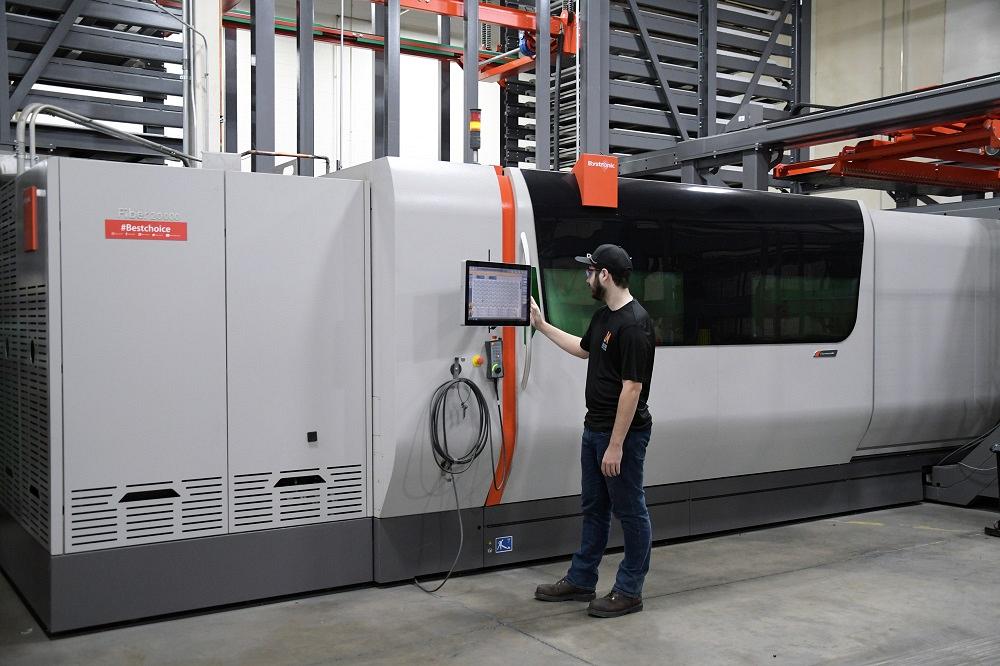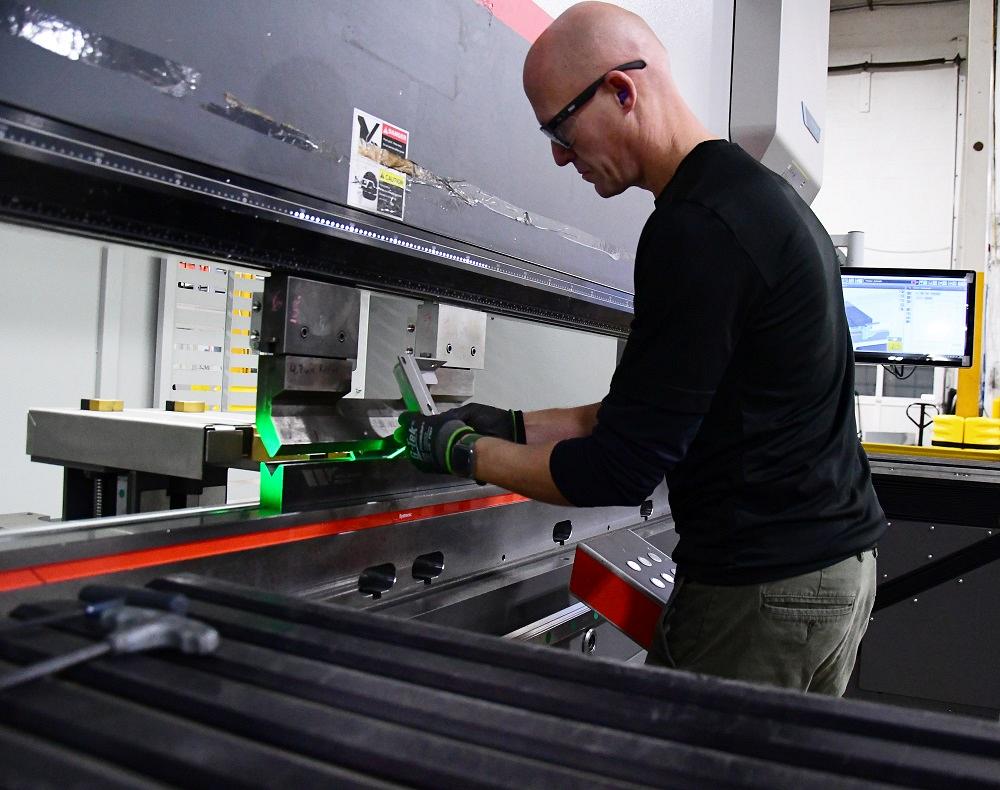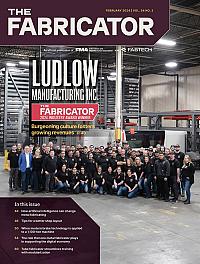Editor-in-Chief
- FMA
- The Fabricator
- FABTECH
- Canadian Metalworking
Categories
- Additive Manufacturing
- Aluminum Welding
- Arc Welding
- Assembly and Joining
- Automation and Robotics
- Bending and Forming
- Consumables
- Cutting and Weld Prep
- Electric Vehicles
- En Español
- Finishing
- Hydroforming
- Laser Cutting
- Laser Welding
- Machining
- Manufacturing Software
- Materials Handling
- Metals/Materials
- Oxyfuel Cutting
- Plasma Cutting
- Power Tools
- Punching and Other Holemaking
- Roll Forming
- Safety
- Sawing
- Shearing
- Shop Management
- Testing and Measuring
- Tube and Pipe Fabrication
- Tube and Pipe Production
- Waterjet Cutting
Industry Directory
Webcasts
Podcasts
FAB 40
Advertise
Subscribe
Account Login
Search
The process of building a successful fabrication company culture
Waukegan, Ill.-based Ludlow Manufacturing, winner of The Fabricator's 2024 Industry Award, provides blueprint for shop floor management, investing in technology, growing a business
- By Dan Davis
- Updated March 5, 2024
- February 12, 2024
- Article
- Shop Management
When the world started to shut down because of the pandemic in the spring of 2020, Ludlow Manufacturing Inc. (LMI) kept working. In fact, they never stopped.
Of course, workers wore masks. They were distanced from each other during meetings. The people who could work at home had the chance to do so. And there was plenty of hand sanitizer.
“Seriously, I still have hand sanitizer coming out of my ears,” said Todd Ludlow, LMI’s founder and CEO.
While all of the precautions might have seemed like overkill at the time, Ludlow said that they were necessary so that the company’s employees felt safe. LMI had work that needed to be done, and people were needed to get those fabricated parts to customers.
The determination to stay open during this time paid off in two major ways for LMI. Sales grew aggressively in 2020 (43% over the prior year) and in 2021 (81% over 2020), but the company didn’t add throngs of people to cope with the new business. The quality processes it had implemented in 2019 had reduced rework claims as a percentage of sales below 1%, a key goal for LMI, and streamlined efforts to introduce new work to the shop floor, adding a bit more predictability to production scheduling and boosting on-time delivery efforts. Even with the additional manufacturing activity, LMI has improved safety performance as well, climbing toward 1,000 days without an OSHA recordable injury.
LMI has grown its business by 150% with about 80 employees, fewer than the almost 100 employees that it had in the early to mid-2010s when it wasn’t processing as much work. In 2023, LMI expected to reach $30 million in sales, and it believes its current manufacturing capacity can accommodate additional growth.
“What we’ve seen over the past five years is that not only have we improved, but that our processes are consistent,” said Chris Byrnside, LMI’s quality and safety manager. “So we know that our processes are verified and that they are going to work whether we’re slammed with work or it’s a slower time. We will have that same consistency.”
For this successful transformation, The Fabricator has named Waukegan, Ill.-based LMI as its 2024 Industry Award winner. The metal fabricator’s growth, spurred on by a commitment to formalize quality and shop floor processes and invest in the latest metal fabricating technology, provides a blueprint for other job shops that are interested in growing their businesses in this age of increased domestic manufacturing opportunities.
Always Time to Improve
Ludlow got his start in metal fabricating as a laser cutting machine operator. His uncle helped him get the job, as Ludlow was trying to start his career in sales. He worked a sales job in the day and ran the laser at night. He also was a newlywed.
He finally found a sales job that allowed him to stop working two jobs, and he left metal fabricating—for a short time. In 1996, his former metal fabricating employer was looking for a new salesperson, and Ludlow accepted his offer.
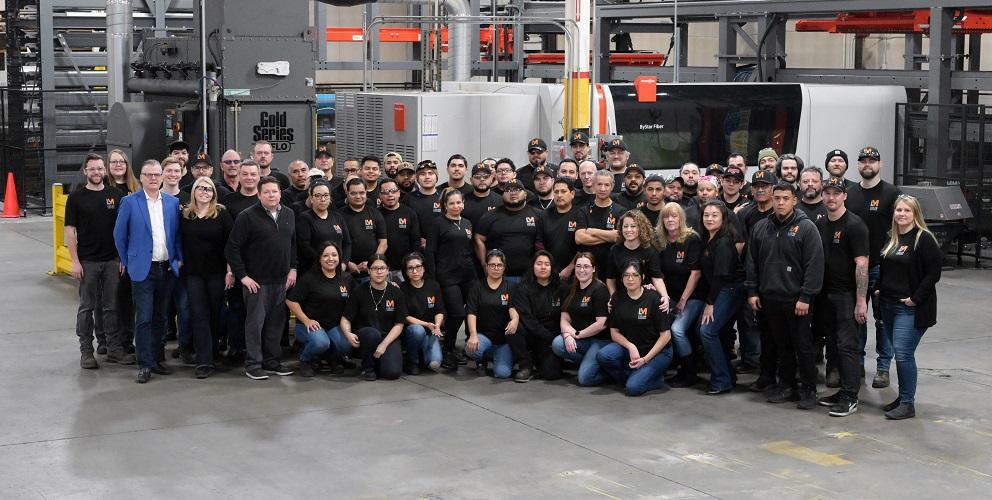
Meet the team at Ludlow Manufacturing Inc., Waukegan, Ill., the winner of The Fabricator’s 2024 Industry Award. Images: Lila Aryan Photography
After about five years selling metal fabricating services, Ludlow struck out on his own to act as an independent sales representative in the metals industry. That lasted for about another five years until Ludlow decided he wanted to run a company his way, without the actions of others defining the way that he’d treat customers and employees.
In January 2005, LMI started in a two-and-a-half-car garage. For almost three years, Ludlow cleared out the garage each morning, processed metal parts, and moved everything back inside late in the night.
In 2007, LMI moved into a 12,500-sq.-ft. shop in Waukegan. Five years later, the company expanded to 40,000 sq. ft., and soon thereafter added another 40,000 sq. ft. Today, the business has 120,000 sq. ft. of manufacturing activity that covers laser cutting, forming, welding, and machining, which Ludlow calls the fastest growing part of the business. (LMI purchased a machine shop in 2023 to bolster its current machining operations.)
Ludlow’s commitment to hard work and a bulldog-like tenacity to grow his company also influenced the way he managed the company. He wasn’t a big “culture guy.” The motivation was money, and the goal was to get quality parts out the door according to the agreed-upon delivery date.
“Just do your job and be happy,” Ludlow said, describing his old-school take on company cultures. “Make more money. Every year you get a raise. That should be the culture. Work hard, make more money now.”
That sheer force of will helped to grow the company, but it wasn’t as easy as it possibly could have been. Humans were looked at as being the way to address new job opportunities. (“Throwing people at it,” Ludlow said.) That stressed existing workers trying to help out new colleagues, while also being responsible for their own tasks, and likely led to retaining some employees that probably weren’t the best fit for the roles they were given.
LMI has turned the corner since those early days. It’s heavily invested in trying to reward its team of employees and foster a strong workplace culture. Some examples include monthly facility-wide catered lunches and team-building activities, such as raffles and games. A monthly newsletter, available in English and Spanish, documents employee news, safety updates, and business updates. An employee-of-the-month program was started, and recipients are honored with a special parking space and given a gift card. LMI now holds an annual company picnic, open to all employees and their family members. The 2023 picnic also hosted a truck from Rogan’s Shoes, and LMI employees were able to try on safety footwear and use a company-provided voucher to purchase the new shoes or boots.
One thing that Ludlow knew was going to be important for his company in those early days was automation. The companies for which he had worked were early technology adopters, and Ludlow had always prided himself in getting to know the fabricating machine tools that could make a major difference for him. That’s why he knew he needed to invest in anything that helped to reduce labor costs.
“When I bought my first new laser from Bystronic in 2008, I actually could barely afford automation. But I remember telling my salesman [Mark Johnson, Fabrication Solutions LLC] that I’m not buying your laser if it doesn't have automation,” Ludlow said. That’s why you’ll see material storage towers and material handling systems on the company’s newest 15- and 20-kW laser cutting machines, as well as parts sorting automation on those same lasers.
By 2019, Byrnside had joined LMI. Fresh from a stint at another metal fabricator in the Chicagoland suburbs, Byrnside said he found a company that had a good foundation of satisfied customers and employees that wanted to do right by those customers. The one thing that did catch his eye was that the company was heavily skewed toward the agricultural and lawn and garden sectors, with one customer representing at least 70% of sales.
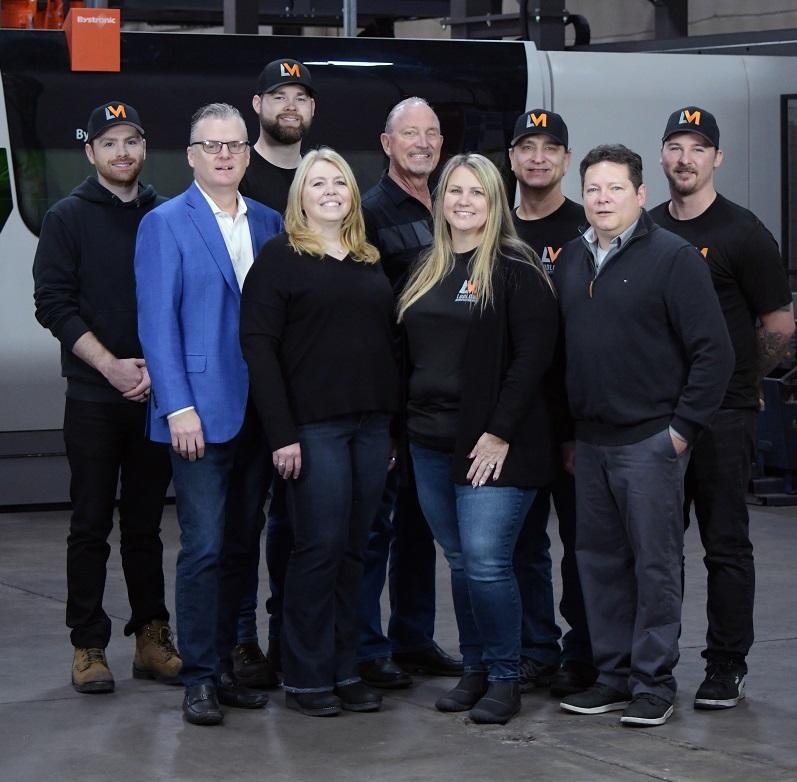
The management team at Ludlow Manufacturing Inc. includes (from left, row 1) Todd Ludlow, CEO; Jenny Ludlow, president; Tammy Rodriguez, human resources manager; Chris Byrnside, quality and safety manager; (from left, row 2) Jackson Ludlow, assistant plant manager; Andrew Johnson, assistant plant manager; Jeff True, vice president of operations; Chris Starzec, vice president of machining and continuous improvements; and Luke Mammen, assistant operations manager.
He said he felt confident that introducing a disciplined quality system to LMI could lead to significant change in the company. He was correct in his assessment.
A Quality Start
One of the first steps that Byrnside took was the implementation of an advanced product quality planning (APQP) process. This basically documents all of the stages of a manufacturing job and keeps quality at the forefront during the entire fabrication cycle (e.g., planning, product design and development, process design and development, product and process validation, and feedback and continuous improvement).
“We have a very unique way here of capturing and presenting what we do to meet the ISO requirements and implement those tools on the floor into every one of our processes,” Byrnside said.
This has allowed the LMI team to be better at risk management, whether that risk might be failing to make a fixture for a part when it’s heading to the shop floor or telling a customer that parts can be delivered, when in reality that can’t happen. During APQP meetings, people are learning what’s happening, what’s changed, and what needs to occur to ensure production goals are met for the day.
Byrnside said that once the quality structure was put in place and training was offered to the shop floor workers, people started to buy into the effort. They understand the purpose of first and last piece checks. They regularly do in-process checks, and they are encouraged to ask questions and consult with the quality personnel if they see something that concerns them. Everyone has been empowered to be a guardian of quality.
“We have shipping people now that before they take something to the truck, they might see that something doesn’t look right,” Byrnside said. “In the past, those people would have no business even questioning something like that, even though they see those parts every day.”
Ludlow said it’s been a significant shift in employee attitudes. Everyone now is “pulling the rope in the same direction,” he said, instead of keeping to themselves and focusing on just their own activities.
“Our goal now is to figure out how to fix issues, and not fix the employee,” Ludlow said. “We want to instruct them. ‘Hey, there’s an issue. We’re not looking to fire you, but we want to know why this happened.’ We take these moments now as teaching moments. It’s OK to make a mistake.”
This renewed focus on quality has proven to make a very big impact on LMI’s goal to minimize bad parts from leaving the facility. Since 2018, the cost of rework claims as a percentage of sales dollars has remained well below the goal of 1%:
- 2018: 0.733%
- 2019: 0.406%
- 2020: 0.375%
- 2021: 0.337%
- 2022: 0.402%
- 2023: 0.442%
But this isn’t just about parts leaving the facility. It’s about new work coming into LMI.
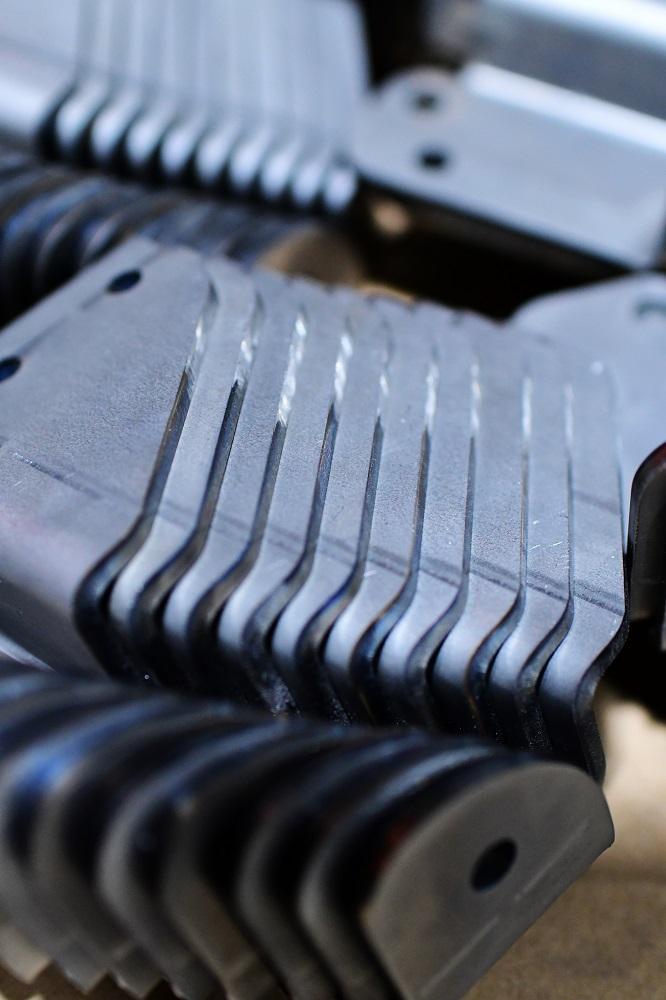
LMI has four laser cutting machines and eight CNC press brakes to process metal parts of various thicknesses.
The production part approval process (PPAP) has been streamlined at LMI, which has eliminated a lot of the inconsistencies that might have once plagued new job introductions into the facility. In the past, lack of communication hampered the PPAP, which led to delays in getting customer sign-off and ultimately affected the ability to deliver parts on time. Now, all aspects of production are in the loop about engineering revisions, customer expectations, potential manufacturing challenges, and scheduling conflicts. (A new ERP system from Global Shop Solutions has helped with scheduling as well.) Surprises are kept to a minimum, and schedules are much more firm than in the past.
In 2023, LMI was on schedule to perform 425 PPAPs, which was significantly more than the three previous years (313 in 2022, 296 in 2021, and 291 in 2020). Over the past four years, LMI has maintained a 99.5% PPAP approval rate and a 96% on-time delivery rate.
Byrnside said the trust that LMI has built up with customers, particularly those long-time partners, has led to a new level of efficiency in supply chain relations. Some of these customers are approving PPAPs even before part samples get to their desks. They trust that the parts are going to meet specifications based on what’s been detailed in the PPAP report.
“We’re seeing these positive results not only in the numbers that we keep, but in our customers’ scorecards and in the conversations with them,” Byrnside said.
As LMI’s only real salesperson, Ludlow said that the quality efforts and the on-time delivery rates make it easier to sell the company’s metal fabricating services. As a result of successful sales efforts in the recent past, LMI now has a much more diversified customer base than it did in 2019. It now serves the automotive, appliance, construction, recreational vehicle, and electrical supply industries. No single customer accounts for more than 27% of the company’s overall sales.
“One of the things that we are focusing on is growing our natural customer base,” Ludlow said. “We have to continue to grow. There are certain pockets of industry that are slower right now, and I don’t want to be caught up in those pockets and not have something else to lean on.”
Safety First
Byrnside also serves as LMI’s safety manager, and he wouldn’t have it any other way. Just like a successful quality program is incumbent on employee engagement and contributions, the same holds true to avoid injuries on the job. Without risk mitigation efforts, an injury is likely around a corner.
In 2023, LMI was a recipient of the Fabricators and Manufacturers Association’s Safety Award of Honor, which celebrates the metal fabricator’s year without lost time due to a work-related accident or illness.
“We want to win that safety award every year,” Byrnside said. “We never want to see that number [on the sign that tracks days without a work-related accident] go to zero. It’s a big deal, and one of the main KPIs that we track.”
Meanwhile, Ludlow doesn’t like to talk about the company’s safety record, sort of like a baseball fan not wanting to mention that the home team’s pitcher is throwing a no-hitter for fear that he might jinx the effort. However, he does like pointing out investments made so that LMI employees can work safely without worry of injury or illness.
“I pride myself on not having a shop filled with weld smoke. I really don’t care how much money it costs me to stop it,” Ludlow said. “People look at my filter bills, and they’re like, ‘You’re nuts.’ I'd rather spend it there than on a really fancy office.”
Automation Makes Sense
Back in the early days of LMI, Ludlow knew that automation would play an important part in him being able to be more competitive when it came to pricing. Recent years have only proved Ludlow’s initial thoughts correct.
All metal fabricating companies struggle to find workers interested in learning the trade from the ground up. Automation has helped LMI avoid a lot of that pain because some of the drudgery of being an entry-level worker is being eliminated.
The addition of the parts sorting technology on new Bystronic lasers is probably the best example. Removing parts from a laser skeleton can be both boring and a literal pain because of all the bending over. In most instances, parts sorting technology can eliminate human involvement and still deliver pallets with parts nicely organized and stacked. This allows LMI to move an operator to another more valuable fabricating activity, such as forming.
Even in the forming area, a visitor will notice a new TRUMPF bending cell with the capability of not only automated bending but also automated tooling changeover. The cell can run for extended periods without any operator involved.
LMI also has press bakes that have the latest crowning correction capabilities and software controls, enabling a new brake operator to be effective without years of experience that typically might be required with older basic brakes. Some of the brakes even have LED light guides that assist operators in placing tooling in the correct position for the next job, helping to minimize the amount of nonforming time between jobs.
“I think every company is realizing that without the automation, you’re going to be in trouble,” Ludlow said.
That’s one of the reasons why he was adamant about moving forward with equipment investment, even in the face of the pandemic and supply chain issues that delayed the delivery of some equipment. He knew the equipment would make a significant impact on the way that LMI could meet its customers’ needs.
“I don’t look at ROIs. I think it’s a waste of time,” Ludlow said. “Anyone can spin an ROI.
“I really look at couple of things,” he continued. “What’s it going to do for us? How are we going to grow from it?”
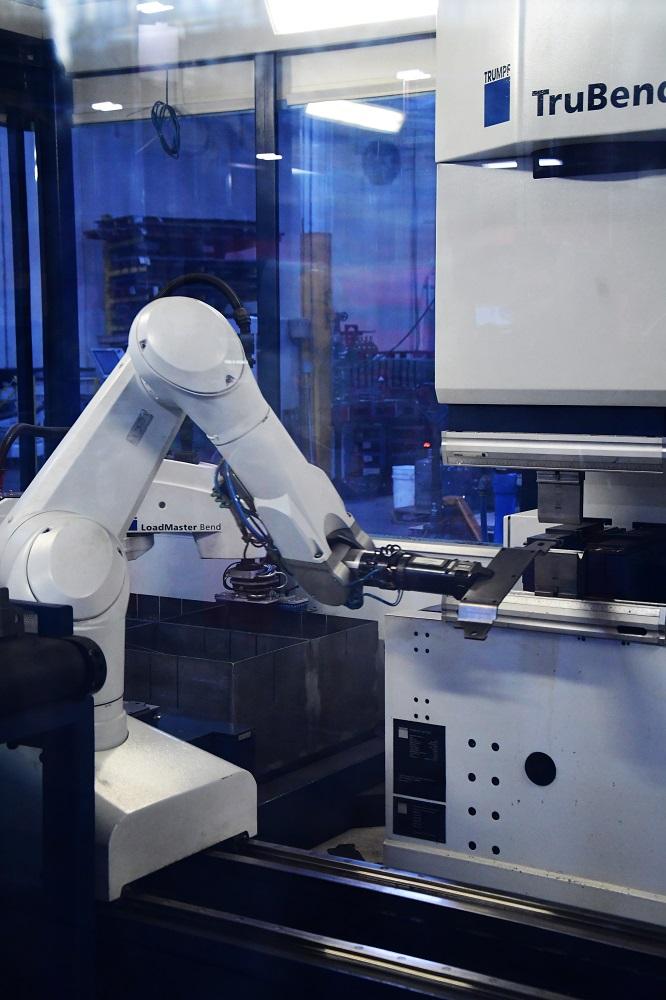
The TRUMPF TruBend 7000 bend cell not only can accommodate material handling of parts at the press brake, but it also comes with automated tooling change to maximize the cell’s uptime.
He added that he also sees it as a personal challenge to find work for any new machine added to LMI’s equipment roster. The monthly payment on the machine is a great motivator.
A Lot to Like
LMI finds itself in an enviable position. Most of the key pieces of equipment are new, typically less than five years old. There’s enough manufacturing capacity available that future company growth shouldn’t require an immediate need for further capital equipment investments.
The workforce seems prepared to tackle more work, particularly from new customers who might be a bit more demanding as they look for supply chain partners they can trust. They have quality systems that not only work but require their input to be effective. They also appear to much more engaged than they were in the early days of LMI.
“Ninety-five percent of the time, everyone wants this company to be successful. And that’s a culture thing,” Ludlow said. “Do we have our issues with culture? Yes. There are things that we don’t do perfectly. But I will tell you that it is night and day from where we were.”
A company can’t simply flip a switch to activate a positive culture. It won’t be able to order one from a vendor either. Sometimes it’s just about doing what’s right by customers and employees and finding out that other things fall into place. LMI has learned that lesson, but it also understands that the learning is never done.
About the Author

Dan Davis
2135 Point Blvd.
Elgin, IL 60123
815-227-8281
Dan Davis is editor-in-chief of The Fabricator, the industry's most widely circulated metal fabricating magazine, and its sister publications, The Tube & Pipe Journal and The Welder. He has been with the publications since April 2002.
Related Companies
subscribe now

The Fabricator is North America's leading magazine for the metal forming and fabricating industry. The magazine delivers the news, technical articles, and case histories that enable fabricators to do their jobs more efficiently. The Fabricator has served the industry since 1970.
start your free subscription- Stay connected from anywhere

Easily access valuable industry resources now with full access to the digital edition of The Fabricator.

Easily access valuable industry resources now with full access to the digital edition of The Welder.

Easily access valuable industry resources now with full access to the digital edition of The Tube and Pipe Journal.
- Podcasting
- Podcast:
- The Fabricator Podcast
- Published:
- 04/16/2024
- Running Time:
- 63:29
In this episode of The Fabricator Podcast, Caleb Chamberlain, co-founder and CEO of OSH Cut, discusses his company’s...
- Industry Events
16th Annual Safety Conference
- April 30 - May 1, 2024
- Elgin,
Pipe and Tube Conference
- May 21 - 22, 2024
- Omaha, NE
World-Class Roll Forming Workshop
- June 5 - 6, 2024
- Louisville, KY
Advanced Laser Application Workshop
- June 25 - 27, 2024
- Novi, MI
























